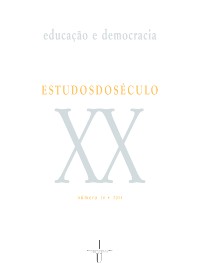Please use this identifier to cite or link to this item:
https://hdl.handle.net/10316.2/36842| Title: | O estudo de renovação urbana do Barredo: a formação social do arquitecto para um território mais democrático | Other Titles: | The study of urban renewal of Barredo: the social training of the architect for a more democratic territory L'étude de renovation urbaine du Barredo: la formation sociale de l'architecte vers un territoire plus democratique |
Authors: | Moniz, Gonçalo Canto Correia, Luís Miguel Gonçalves, Adelino |
Keywords: | Territory;Cultural Heritage;Barredo;Education;Fernando Távora;Territoire;Patrimoine;Barredo;Éducation;Fernando Távora;Território;Património;Barredo;Educação;Fernando Távora | Issue Date: | 2014 | Publisher: | Imprensa da Universidade de Coimbra | Abstract: | O Estudo de Renovação Urbana do
Barredo sugere, pelo seu título, que
se trata de um projecto de intervenção
num sector urbano do Porto.
Porém, os seus objectivos eram mais
amplos e visavam a definição de uma
política de reabilitação urbana integrada.
No contexto político e social
em que foi elaborado, emergiram os
movimentos do Maio de 68 reclamando
o direito à cidade enquanto
território público e democrático.
Neste contexto, era necessário formar
um novo tipo de arquitecto e esta
consciência esteve bem presente no
II Encontro Nacional Arquitectos
(1969), onde foi reivindicada a necessidade
da formação do arquitecto
integrar a função social, em complemento
à sua função artística e técnica.
De modo semelhante, esta questão
encontrava-se em discussão no seio
da Escola Superior de Belas-Artes do
Porto (ESBAP) e era objecto de
experiências pedagógicas que procuravam
dar resposta a esta exigência
de formação do arquitecto. Neste
contexto, o Barredo foi um laboratório
de metodologias de intervenção
urbana a partir de um conhecimento
profundo das suas realidades arquitectónicas
e sociais. Este artigo demonstra
a importância que o Barredo
teve no programa educativo da
ESBAP e na criação de uma consciência
crítica do arquitecto, cultural e socialmente sensível, no planeamento
e na intervenção na cidade
existente. L'Étude de Rénovation Urbaine du Barredo suggère, par soi-même, qu’il s’agit d’un projet d'intervention dans un secteur urbain du Porto. Cependant, ses objectifs étaient plus vastes et envisageaient la définition d'une politique de réhabilitation urbaine intégrée. Dans le contexte politique et social dans lequel il a été élaboré ont émergé les mouvements du Mai 68 postulant le droit à la ville en tant que territoire public et démocratique. Dans ce contexte, il était nécessaire de créer un nouveau type d'architecte et cette prise de conscience fut bien présente au Rencontre National d’Architectes (1969), où il a été revendiquée la nécessité de la formation de l'architecte intégrer une fonction sociale, au-delà de sa fonction artistique et technique. De même, cette question était en train d’être débattue au sein de l'École Supérieure de Beaux-Arts du Porto (ESBAP) et faisait l'objet d'expériences pédagogiques qui cherchaient réponse à cette exigence de la formation de l'architecte. Cet article démontre l'importance que Barredo a eue sur le programme éducatif de l’ESBAP et à la création d'une conscience critique de l'architecte, culturel et socialement sensible, à la planification et à l'intervention dans la ville existante. The Study of Urban Renewal of Barredo suggests, by its title, that it is a proposal for an intervention in a sector of Porto. However, its aims were broader and were designed to define a policy of integrated urban rehabilitation. In the political and social context of May 1968 in which it was drafted a set of movements had emerged claiming the right to the city as a public and democratic territory. In this context, it was felt necessary to train a new kind of architect, and this awareness was present at the 1969 National Meeting of Architects (1969), where it was claimed the need to sum the social function in addition to the artistic and technical functions. Similarly, this issue was under discussion within the Porto Higher Institute of Fine Arts (Escola Superior de Belas Artes do Porto) (ESBAP) and was the subject of pedagogical experiments that sought to respond to this training requirement of the architect. In this context, Barredo was a laboratory methodology for urban intervention from a thorough understanding of their architectural and social realities. This article demonstrates the importance that Barredo had to ESBAP education program and for the establishment of a critical awareness of the architects, culturally and socially sensitive on the planning and intervention in existing city. |
URI: | https://hdl.handle.net/10316.2/36842 | ISSN: | 1645-3530 1647-8622 (digital) |
DOI: | 10.14195/1647-8622_14_16 |
| Appears in Collections: | Revista Estudos do Século XX |
Files in This Item:
| File | Description | Size | Format | |
|---|---|---|---|---|
| o_estudo_de_renovacao.pdf | 3.48 MB | Adobe PDF |  |
Items in DSpace are protected by copyright, with all rights reserved, unless otherwise indicated.
